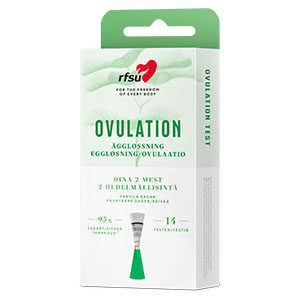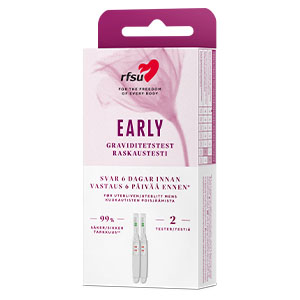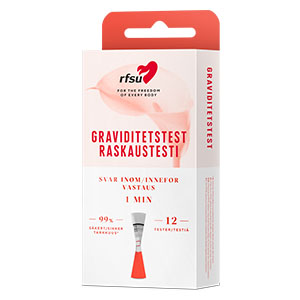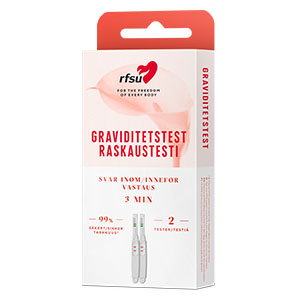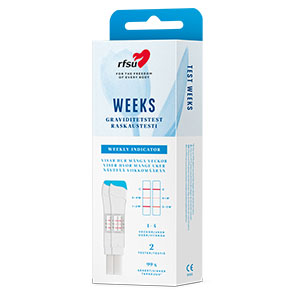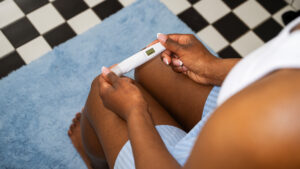
Trying to get pregnant – learn how to increase your chances
Trying to get pregnant is quick for some - but takes longer for others. About 8 out of 10 couples who try to get pregnant succeed within a year. For others, it can take longer, which can be both stressful and frustrating. But reduced fertility is much more common than not being able to conceive at all. Here you can read more about why it is sometimes difficult to get pregnant - and what you can do to improve your chances when trying to conceive.
Difficult to get pregnant – why is it so?
Many people wonder why it doesn’t happen right away. The chances of getting pregnant depend on several factors, both physical and lifestyle-related. In about a third of cases, the difficulty is due to something in the woman, a third to something in the man, and in the last third there are reasons in both partners. Sometimes no clear explanation is found at all.
A common reason in women is that ovulation is not regular. In men, it can be low sperm quality or no sperm at all. Age also plays a crucial role. Especially for women. Fertility declines gradually from the age of 30-35, which can make it harder to get pregnant the longer you wait. The average age of first-time mothers in Sweden has increased from 24 to 29 over the last 30 years, which is one reason why more people are seeking help today.
What are the chances of getting pregnant?
About one in five couples in Sweden have difficulty conceiving at some point. It can be frustrating and stressful when pregnancy fails to materialise despite the desire to do so. But it takes time, and it often requires patience and repeated attempts. If you have been trying to get pregnant for a year without success, it may be time to contact your healthcare provider for an assessment.
When a healthy man and a healthy woman have unprotected sex, the chances of getting pregnant are around 2-4%. If the same couple tries to get pregnant by having unprotected sex throughout the menstrual cycle, the chances are around 20-25%.
This assumes that:
- The woman’s ovaries are functioning properly so that good quality eggs can mature.
- The woman is ovulating – if you have regular periods, this usually means that you are also ovulating.
- The fallopian tubes work so that an egg can be caught and fertilised by sperm swimming up the tubes, and the fertilised egg can be transported down to the uterus.
- The man has enough sperm and they move well.
- The lining of the uterus is able to receive a fertilised egg so that it sticks and develops further.
- A functioning sexual life.

How often should you have sex during ovulation?
To increase the chances of getting pregnant, it is recommended to have sexual intercourse approximately every other day during the fertile period. This means that you should have sexual intercourse from about three days before ovulation until the day after ovulation. Sperm can survive for up to five days, so they can be in place waiting for the egg when it is released. For many people, it feels more relaxed to have intercourse regularly a few times a week, rather than trying to time it exactly right.
Getting help to conceive a child
However, getting pregnant is not always easy. For some, it happens quickly, while others need more time and sometimes even support. When you have been trying for a long time without success, it may be time to get help to conceive. An infertility assessment is often the first step. It is done to find out if there is anything preventing pregnancy and, if so, what the reasons are.
Failure to conceive can be due to a number of factors, sometimes beyond your control, such as a congenital abnormality or an illness. To get the right help, you first need to understand the cause. Once the investigation is complete, you can look at different options. For those who want to get pregnant, these may include timely sexual intercourse, insemination or in vitro fertilisation, depending on what the body needs.
Planning to get pregnant
When planning to get pregnant, it is good to understand how the body works. Pregnancy can only happen if an egg is fertilised by a sperm. This can happen during ovulation and the first 24 hours afterwards. The body then releases an egg that passes through the fallopian tube. It is during this time that the chances of getting pregnant are highest.
The egg is fertilisable for about 12 to 24 hours. If you have sexual intercourse during these days or insert sperm into the vagina, there is a good chance that pregnancy will occur. Planning to get pregnant is about knowing your cycle and being sensitive to your body’s signals. If it still doesn’t work, it’s important to know that there is support and help available. Then it may be time to contact the healthcare system to get help to become pregnant.
Don’t forget though that the sperm can live inside the uterus for several days! They can therefore be in place and wait for the egg when it arrives. It can be easier and more harmonious to have intercourse 2-3 days a week, regardless of which day of the menstrual cycle it is, rather than trying to pinpoint the exact day of ovulation, which can be stressful for many.
So how should you plan your sex life to have the best chance of pregnancy? If you try to have intercourse from about 3 days before the day of ovulation to the day after the day of ovulation, then the chance is greatest that the egg will be fertilized. If you are unsure when ovulation occurs or want to plan the right days, you can use our ovulation calendar to help with your planning.
If you have irregular periods, it can be difficult to know exactly when ovulation will occur. Then you can also use an ovulation test to find out when or if you are ovulating. The ovulation test measures the LH hormone in the urine and shows the two most fertile days during a menstrual cycle.
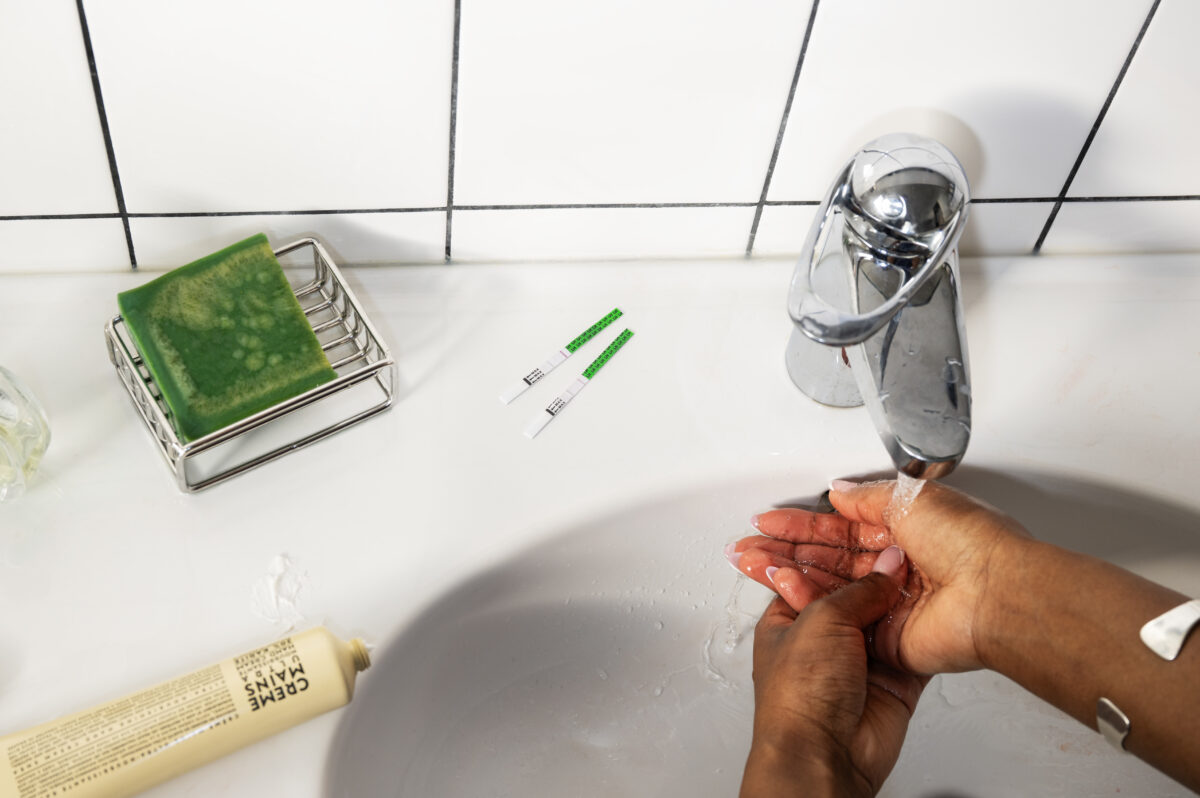
What are the chances of getting pregnant during ovulation?
Ovulation is when the chances of getting pregnant are highest. The likelihood of getting pregnant during sexual intercourse on the most fertile days – around two days before to one day after ovulation – is highest. The egg can be fertilised up to 24 hours after ovulation, but sperm can survive in the uterus for several days and therefore fertilise the egg if intercourse took place earlier.
How often should you have sex when you ovulate?
To maximise the chances of getting pregnant, it is good to have sexual intercourse regularly, preferably every other day during the fertile days. It can be more relaxing to have sex 2-3 times a week rather than just focusing on ovulation day, which many people find stressful.
How long does it take to get pregnant after intercourse?
If fertilisation occurs, sperm can fertilise the egg within a few hours of intercourse. The fertilised egg usually attaches to the uterus after 6-10 days, at which point the body starts producing the pregnancy hormone hCG.
How easy is it to get pregnant?
Most couples who try to get pregnant succeed within a year. However, fertility is influenced by several factors, including age, ovulation, lifestyle and general health. It is common to take time and not succeed immediately.
What are the chances of getting pregnant in general?
About 8 out of 10 couples succeed in getting pregnant within a year if they have regular sexual intercourse. The probability per cycle is around 20-25% for a healthy woman in her 20s, but it decreases with age.
How does age affect the chances of getting pregnant?
A woman’s fertility starts to decline after the age of 30 and drops further from the age of 35. Getting pregnant becomes more difficult with age and is a common reason for couples to seek help.
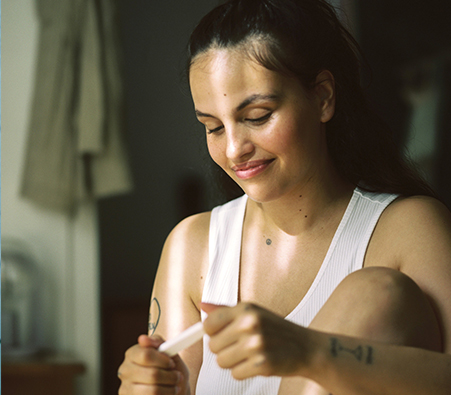
How quickly can you get pregnant after stopping the pill?
It is possible to get pregnant immediately after stopping the pill. However, it can take different amounts of time for the menstrual cycle to become regular again. For some, it happens immediately, while others may have to wait several months.
How does lifestyle affect fertility?
A healthy lifestyle can increase your chances of getting pregnant. This means eating nutritiously, quitting smoking, reducing alcohol consumption, maintaining a balanced weight and exercising regularly. Being overweight or underweight can have a negative impact on fertility.
Should I take folic acid if I am planning to get pregnant?
Yes, it is recommended to take folic acid before pregnancy and during the first trimester. It does not increase the chance of getting pregnant, but reduces the risk of foetal damage and early miscarriage.
Can alcohol affect the chances of getting pregnant?
The impact of alcohol on fertility is not fully understood, but it is wise to reduce or abstain from alcohol when trying to conceive. Alcohol affects fertility in both women and men.
How do I know when I’m ovulating?
You can calculate ovulation with an ovulation calendar or use ovulation tests that measure the LH hormone in urine. These tools show the two most fertile days of the menstrual cycle.
How to maximise your chances of getting pregnant?
To maximise your chances of getting pregnant, you should have regular sexual intercourse during your fertile days, know when you are ovulating, lead a healthy lifestyle, take folic acid and avoid tobacco and alcohol.
Source: www.1177.se and fact-checked by RFSU clinic


